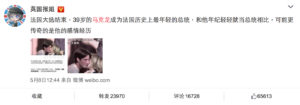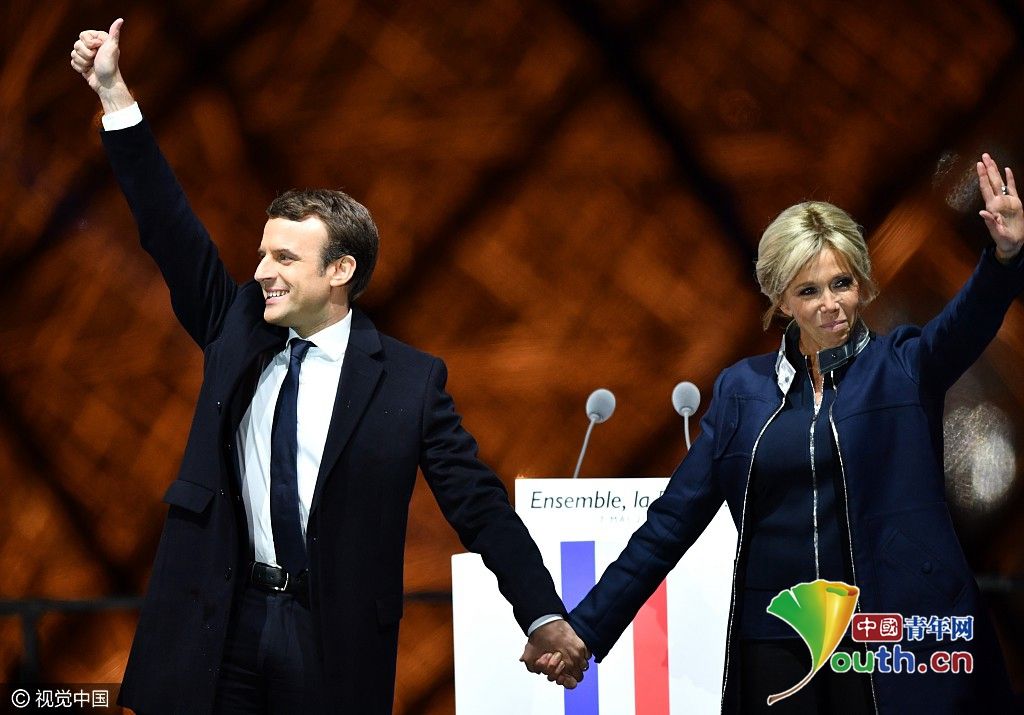In China, talk of the newly elected French President Emmanuel Macron (埃马纽埃尔 马克龙) —also dubbed “little fresh meat” (小鲜肉) by Chinese netizens—skyrocketed following the second round of the French Presidential election on May 7, 2017.
Across three of the social media most frequented by Chinese netizens, including WeChat (微信), Sina Weibo (新浪微博), and Zhihu (知乎), the most popular posts displayed landslide positivity towards Macron. Notably, the term “little fresh meat” (小鲜肉), is a slang word used to describe pure-hearted, handsome young men. Particularly, the majority of these social media posts took a near-exclusive interest in Macron’s marriage with Brigitte Macron, who is 24 years his senior. In most of these discussions, Chinese netizens have come to view Macron’s marriage as the epitome of true love. Within the scant social media talk that did exist regarding Macron’s politics, however, his prospects are not quite as rosy. Alongside official Chinese news publications, these social media posts expressed uncertainty towards Macron’s ability to steer France’s future onto a positive path.
Macron in China: Entering the spotlight
From this mix of both positive and negative attention, Macron has, since his election, been a hot topic on China’s largest search engine Baidu (百度). Throughout May, Macron’s popularity on Baidu has been considerable in comparison to the television series Ode to Joy 2 (欢乐颂2), as well as the singer LAY (张艺兴)— two topics that have, respectively, topped the list of the hottest subjects and public figures on Sina Weibo as of May 25. The number of searches regarding Macron peaked at 468,230 on May 10, three days after his election. This number is eight times larger than the number of searches on LAY, which peaked at 59,094 on May 6, two days after the singer performed a song that went viral online.
Compared to Ode to Joy 2, however, Macron’s popularity is dwarfed. Searches on the television series peaked at 1,338,850 searches on May 24, about two weeks after its release.

Baidu Index between May 1, 2017 and May 24, 2017 for the number of searches on the keywords“Macron”(马克龙), shown in blue; “Ode to Joy 2”(欢乐颂2), shown in green; and “LAY” (张艺兴), shown in orange.
Nonetheless, with 242,645 average weekly Baidu searches around the time of his election, Macron appears to be the second most searched head of state in China among his better-known counterparts who were elected since 2016. Compared to Macron, United States President Donald Trump (唐纳德·特朗普) garnered twice the amount of attention when he was elected in November 2016, with a peak weekly average of 525,122 searches. On the other hand, Macron was twice as popular as Taiwan’s leader Tsai Ing-wen (蔡英文), who peaked at 138,147 searches around her inauguration in May 2016. Additionally, Macron was also nine times more searched than the Philippines President Rodrigo Duterte (罗德里格·杜特尔特), who had received the most searches when he met with Xi Jinping (习近平) in October 2016, with a weekly average of 28,219 searches.

Baidu Index Between January 1, 2016 and May 24, 2017 for the number of searches on the keywords “Macron”(马克龙), shown in blue; “Trump” (特朗普), shown in green; “Moon Jae-in” (文在寅), shown in orange; Tsai Ing-wen (蔡英文), shown in pink; and Duterte (杜特尔特), shown in purple.
Moreover, Macron had, since his election, garnered 24 times more attention than François Hollande (弗朗索瓦·奥朗德), who had a weekly search average of 10,259 when he became France’s president-elect in 2012.

Baidu Index Between January 1, 2012 and May 24, 2017 for the number of searches on the keywords “Macron”(马克龙), shown in blue, and “Hollande” (奥朗德), shown in green.
Inauspicious prophesies for France
Among Chinese netizens who invested attention in Macron, however, those who spoke of his policies were pessimistic towards France’s future. Despite there was only one definitively negative post regarding Macron across a selection of China’s top 15 social media posts, equally distributed among WeChat, Sina Weibo, and Zhihu; this single negative post has surfaced as the most-liked opinion regarding Macron on Zhihu at 2,228 likes. According to the post’s author Wei Shu Xi (喂蜀黍),“It doesn’t matter who was elected, France is doomed.”

Zhihu (知乎) post by user Wei Shu Xi (喂蜀黍) on May 8.
The problems facing France are much larger than Macron’s capabilities, Wei Shu Xi said in the post. Wei Shu Xi added that France is plagued by an unsustainable social welfare system, a collapsing fiscal policy, as well as increasingly high labour costs that are killing the vitality of businesses––immense issues that neither Macron nor Le Pen are capable of resolving. Moreover, another one of the top 5 posts on Zhihu, written by the user Zhang Jia Wei (张佳玮), reportedly a Chinese citizen living in France, echoes a similar view. According to Zhang Jia Wei, many French citizens voted for Macron not to support him, but merely to oust Le Pen. Macron is not necessarily a good president, Zhang Jia Wei said in the post, but Le Pen would surely have been a bad president. Thus, a strand of mainstream belief runs strong on Chinese social media that the future of France is beyond salvation.
Reflections of a troubled society
Meanwhile, commentaries that demonstrated an explicit distaste for Macron were also circulated on Chinese social media. Some alleged that his election was the result of a corrupted French political system while others feared that his political orientation would continue to make way for a supposed takeover of France by the country’s growing Muslim population. On May 9, the popular WeChat (微信) channel Jin Ri Ping Shuo (今日平說), ranked WeChat’s top 22th account as of May 23, posted an article claiming that Macron had come to power through his wife Brigitte Macron, allegedly the daughter of an immensely wealthy French corporate family.

Headline of an article by WeChat (微信) account Jin Ri Ping Shuo (今日平說) on May 9.
In the post, the account’s controversial owner Zhou Xiao Ping (周小平) said, “Naive! Did you really think that the handsome French president is a perfect lover?”
The post had garnered up to 42,921 likes and even roused the attention of French news outlet Courrier international, which published a piece regarding the WeChat post. The post, however, was eventually taken down by WeChat due to reportedly unlawful content. According to Zhou, Macron was superior to Le Pen as a presidential candidate, and his election is in fact beneficial to China. Nonetheless, Macron’s rise to power was an example of an unfair system of personal connections that dominates France, Zhou alleged in the post. Macron’s marriage represents a story of marrying into power via Machiavellian scheming, Zhou added.On the other hand, there existed a niche of Chinese netizens who associated Macron’s political orientation with a “Muslim” takeover of France. According to a top post by Zai Gui Zhou Chi La Rou (在贵州吃腊肉) on Zhihu, which had garnered 777 likes as of May 24, France is en route to becoming “France-stan” (法兰西斯坦), a state governed by a Muslim majority. The term “France-stan” is a play-on-words which alludes to countries with a Muslim majority, such as Afghanistan or Uzbekistan.

Zhihu (知乎) post by user Zai Gui Zhou Chi La Rou (在贵州吃腊肉) on May 14.
The term “France-stan”, prophesizing the conversion of France into a Muslim state, has come into popular use on the Chinese web. The term is often used to contextualize Muslim populations as a problem and is occasionally linked to imaginations of a dystopian society rife with perverse human suffering.
The making of a legend
In general, however, dire opinions regarding Macron represent a small fraction of Chinese social media’s top posts. From WeChat to Sina Weibo and Zhihu , the top 15 posts regarding Macron are mostly intrigued by the new president’s persona. As of May 24, the most popular positive post regarding Macron across all three social media, written by WeChat’s top 26 most popular account Ying Guo Bao Jie (英国报姐), stressed the “legendary” quality of Macron both as the youngest president in French history and as the unusual lover to a woman many years his senior.

Sina Weibo (新浪微博), post by user Ying Guo Bao Jie (英国报姐) on May 8.
“The French presidential election has ended; 39 year-old Macron succeeded in becoming the youngest president in the history of France,” the Ying Guo Bao Jie said in the post. “Comparing to his presidency at such a young age, perhaps even more legendary is his love story.” This romantic view of Macron was echoed across every positive view among the top 15 posts regarding Macron on three major social media in China. Alongside characterizations of Macron’s marriage as a model of brave and steadfast romance, praises of his “good looks,” diverse talents, and refined upbringing were also widely circulated. Moreover, Macron’s association to romance was so solidified that some Chinese businesses saw value in developing Valentine’s Day marketing strategies based on his image.

Headline of a commercial by WeChat (微信) account Wu Mei Chao Shi (物美超市 )on May 16.
In preparation for China’s unofficial Valentine’s Day on May 20, a commercial WeChat account Wu Mei Chao Shi (物美超市), which had been WeChat’s top 14 most popular account as of May 23, employed the story of Macron’s romantic relationship in its headline for a special sale. “So here’s how the French President Macron spends 520!” Wu Mei Chao Shi stated in its advertisement for a 50 percent discount on chocolates.
Officially, China remains undecided on Macron’s political prowess
On China’s official news publications, however, articles display a general negativity and uncertainty towards Macron’s ability to lead France. Although top articles from news outlets such as Xinhua News Agency (新华社) and Guang Ming Daily (光明日报) approved of the new president’s current performance, they maintained doubts concerning the political inexperience of both Macron and his party.

Excerpt of an article by Xinhua News Agency (新华社) on May 22.
“The young but mature Macron had executed a beautiful ‘battle for parliament seats’ early into his presidency,” Xinhua News Agency stated in an article. “In a single move, he has demonstrated determination for enacting reforms and ruptured his strong rightist Republican enemy by setting a scheme for the upcoming parliament election.” On a Guang Ming Daily (光明日报) article, however, assistant researcher for the Institute of European Studies of Chinese Academy of Social Sciences (中国社会科学院欧洲研究所) Huang Meng Meng (黄萌萌) expressed doubts towards Macron’s ability to overcome France’s robust traditional rightist and leftist parties in parliament elections.

Excerpt of an article on Guang Ming Daily (光明日报) on May 17.
Macron has taken on a presidency full of challenges, Huang said, calling for continued observations on political interactions in Europe. Whereas Macron’s political disposition elicited a mild pessimism in China, his unusual romantic life stunned the country’s netizens, rousing a popular interest that overshadowed his political person. The Chinese people have yet to develop a sure opinion on Macron’s presidency. In the meantime, however, they may found in him a new imagination of romance.
Featured Picture Source: Youth.cn (中国青年网)





